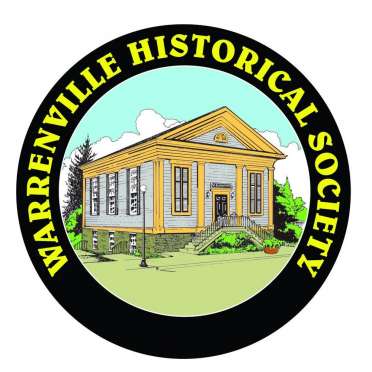Warrenville 2023 Cemetery Walk: History of the Cemetery
On Sunday, October 15th we shared community history during our Annual Cemetery Walk. Over the next two weeks we will be sharing the scripts that were read that evening. Today we start by sharing the history of the Warrenville Cemetery. If you'd like to learn more about Warrenville history, stop into the museum On Sundays, we are open from 1-3pm and always free!
"Good evening. Welcome to the Warrenville Historical Society’s 16th Annual Cemetery Walk.
"Julius Morton Warren founded the community of Warrenville in 1833 and was elected to the state legislature in 1844. During his time as a legislator, he was one of the sponsors of the Illinois Cemetery Act, which established regulations and guidelines for the operation and maintenance of cemeteries in Illinois and became law in 1845. The Warrenville Cemetery Association was founded shortly after on March 3, 1845. An important foundational organization for the growing community, the Cemetery Association is the second oldest organization in Warrenville, preceded only by what is now called Community Baptist Church, which had been founded in 1834 in the Warren home. The Cemetery has been governed by a volunteer Board of Directors for its 178-year history.
"Before this cemetery was established in 1845, there was already a burial ground in Warrenville, located on the east side of First Street, today’s Winfield Road, between what are now called Greenview Avenue and Butterfield Road. Land was purchased from Julius Warren for a larger cemetery along Big Woods Road, today’s Warrenville Road, where we find ourselves this evening. The graves from the old burial ground were relocated, either to this cemetery, the Naperville Cemetery, or Big Woods Cemetery on Eola Road.
"The volunteer cemetery board met faithfully through the years, often meeting in one of the Academies, schools located in Warrenville in the mid-1800s. During the Civil War, the number of burials in the cemetery nearly doubled. Warrenville, a town of about 250, had sent 50 men and boys to the war and a third of them died in combat, prison, or from accidents or disease. In 1885 additional property was purchased for the cemetery grounds from William Manning, often referred to as the second founder of Warrenville. Today the cemetery is almost 5 acres and has 2,950 gravesites, about 1,650 are occupied.
"Local resident John Player, owner of Player Dairy, took a special interest in the cemetery in the mid-1900s. Mr. Player is responsible for the bell motif fence along the front of the cemetery as well as the stone columns at the entrances. He also obtained the large planter from the right-of-way of the Chicago Aurora and Elgin railway, when the train line went out of business in 1957. The flag platform at the back of the cemetery was a joint effort of the Cemetery Association, the VFW and its Ladies Auxiliary. It was completed around 1996 and was dedicated on May 29, 2000.
"Over the past few years, the Warrenville Cemetery Association has worked with a conservator to repair some of the oldest graves that have gone through extensive weathering and been damaged over the years. This crucial process has helped preserve important pieces of local history. Thanks to the hard work of many volunteers, including the late Michael Harrington, you can also search the Warrenville Cemetery on the free online resource FindAGrave.com. The Historical Society has also started the process of updating FindAGrave listings with information from our archive. If you need help in researching someone buried here, please reach out to the museum for help.
"There are many stories that can be told here, and tonight we will focus on the impact of the railroad. You’ll hear stories about why Warrenville didn’t get a railroad in its early days, despite it being one of the most important communities in DuPage County in the 1840s; you’ll hear about those who worked on the Chicago, Aurora & Elgin, the trolley elective interurban train that finally brought passenger service to Warrenville in 1902; you’ll hear about high school students that took that train to school in Wheaton, and you’ll also hear about those who lives were ended because of the train. The stories you will hear tonight will paint just a piece of picture of life in Warrenville. If you have any additional information to share, please reach out Sara at the Museum.
"Thank you for joining us tonight, we hope you enjoy the evening walk through history. "


